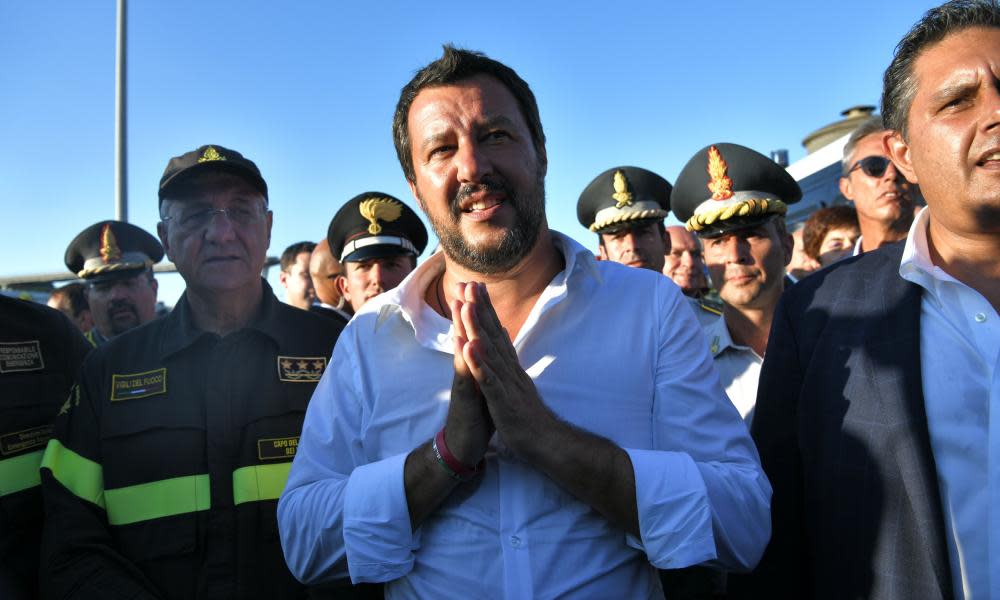Politicising the Genoa tragedy is just the latest Europhobic ruse

After the Genoa bridge collapse left dozens dead, Italy’s far-right deputy prime minister, Matteo Salvini, lashed out at the EU. “If EU budget constraints prevent us from making Italy’s infrastructure safe, we will change that,” he tweeted. Europhobes of all stripes like to cast themselves as the newly insurgent, a rising anti-elite tide; but in many ways, they’re old school. They offer no solutions and their cynicism is blatant.
The worry is that populists right and left may heed Salvini’s message, even if they don’t necessarily repeat it. They’ll point to the austerity measures Italy was subjected to in the wake of the eurozone crisis. It may matter little to them that the EU does not place restrictions on how governments spend their budgets. Nor perhaps that it has been reported that only 12% of Germany’s 40,000 bridges are in good or very good condition – and this in a country that posted a record €38.4bn (£34.3bn) budget surplus in 2017.
An Italian inquiry will hopefully establish what caused the Genoa disaster. It might also determine whether any EU standards were breached in the maintenance of the bridge. But meanwhile, Salvini’s reaction will have shown yet again how easily the EU gets blamed whenever something goes wrong – in this case, tragically wrong – just as it gets so little praise when there’s good news.
Europhobia has a long and complex history. There was resistance to the European project from the very outset. As Salvini and his allies elsewhere in Europe mount their offensive on the EU, it helps put things in perspective to recall how antiquated many of their ideas are. A recent book by the French historian Bernard Bruneteau, Combating Europe: From Lenin to Marine Le Pen, provides just that historical context.
The word “Eurosceptic” first appeared in a 1985 Times article, describing Tory critics of the Single European Act. But Euroscepticism long predates that: 70 years earlier, Lenin argued: “Under a capitalist regime, the United States of Europe are either impossible or reactionary.” The “bourgeois” peace that would result from such an agreement would “only be aimed at jointly suffocating socialism in Europe”, he wrote.
Today, anti-EU sentiment is often ascribed to the far right and its nationalist obsessions. But the European left has its own record of opposing the project. In 1950s France, a powerful Communist party warned the country would become “an annex of the Ruhr, and an American colony”. Meanwhile, statists and Gaullists feared the nation’s sovereignty – recently restored after war and occupation – would come undone. Sound familiar?
During the cold war, anti-capitalist “internationalism” among western Europe’s far left focused on visions of bringing humanity together; but certainly not Europe. Given their imperialist instincts, Europeans didn’t deserve to be rewarded by a project that would strengthen them, went that logic. To this day, it’s easy to spot how some of that thinking still lingers in radical leftwing criticism of the EU: Europe’s priority should be to repent for its colonial crimes, not to try to shape the world.

Anti-German sentiment is another old feature of Europhobia. And it is hardly a monopoly of the right. It can be found among the likes of Jean-Luc Mélenchon, leader of France’s hard-left opposition, who’s been invited to speak next month at a fringe event at the Labour party conference. Mélenchon will no doubt reject the comparison, but his depictions of the EU as “a new German empire” bring to mind Trump’s portrayals of it as a “vehicle for Germany”.
In Scandinavia, not least in Denmark, hostility to the European project goes back decades, its roots found in concerns that it might threaten national welfare models developed in the early 20th century. As for eastern Europe, it’s often said the region’s disgruntlement with the EU stems from the 2015 refugee crisis. But this overlooks how Václav Klaus, president of the Czech Republic from 2003 to 2013 and a fervent admirer of Margaret Thatcher, fiercely criticised the club even as his country was joining it in 2004 (that day, he said: “We are both gaining and losing something”). In the late 1990s when I asked a Polish government minister what he expected from Europe, his answer was “a Europe of cathedrals” – not exactly what EU leaders had in mind.
The list of Europhobia’s various manifestations is not only long, it’s also full of apparent paradoxes. For example, who remembers that Marine Le Pen’s party (then led by her father) only became an enemy of the European project in the early 1990s? Before that, it embraced it as a protection against the Soviet Union.
It might be easy to forget at a time when anti-European populists from Salvini to Hungary’s Viktor Orbán are making headlines – not to mention Trump’s former strategist Steve Bannon setting up a pan-European “anti-Soros” movement in Brussels – but hostility towards Europe has long predated the current populist wave. Europhobia may seem to line up new faces, but they’re slapped on to old ideologies.
An optimist might say: if Europe has managed to build itself up despite so much longstanding opposition from within, it may well have a good chance of weathering today’s difficulties. Talk of its demise has so far been exaggerated. And it’s not as if Europhobes can offer anything approaching a convincing alternative plan for their countries – apart, that is, from a jump into the void. Brexit Britain’s despondency is a case in point. Europhobes have some things in common, but there’s also a lot that divides them, whether on the economy or on identity – so how can they possibly come together to form a wrecking ball?
But a pessimist will say: just watch them try harder. Bodies were still being pulled out of the rubble when Salvini wasted no time politicising the Genoa tragedy to galvanise yet more anti-EU sentiment. That says a lot.
• Natalie Nougayrède is a Guardian columnist

 Yahoo News
Yahoo News 
